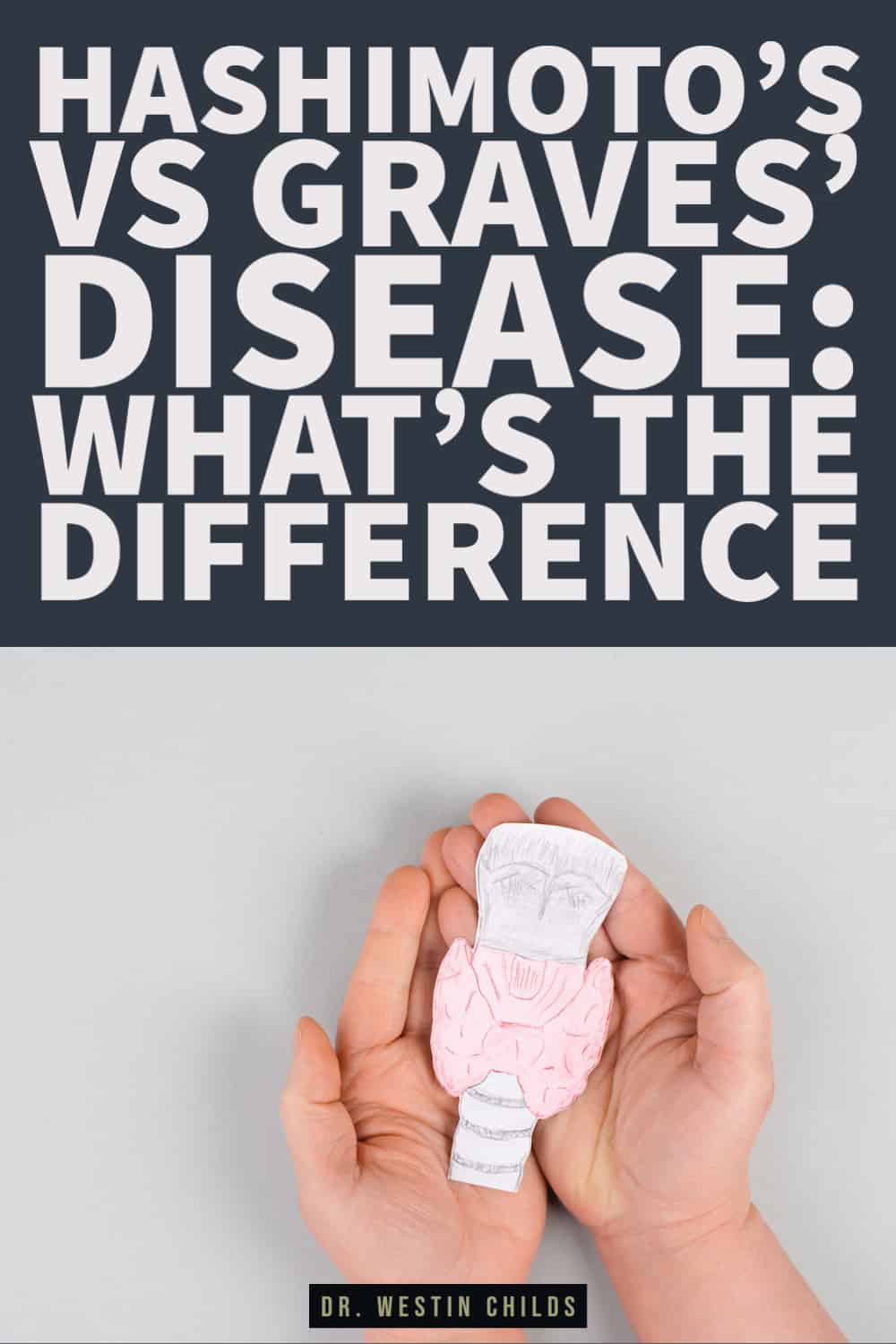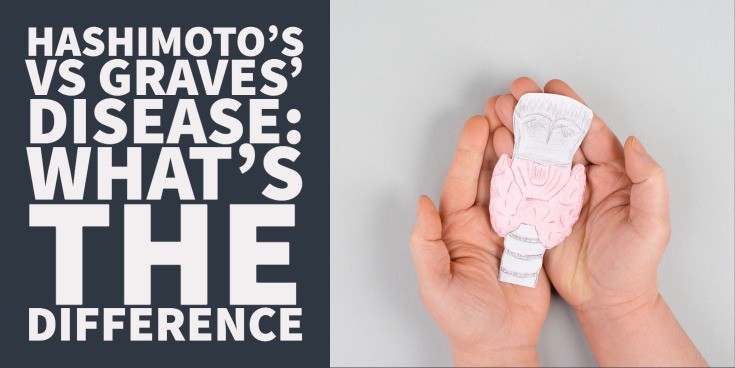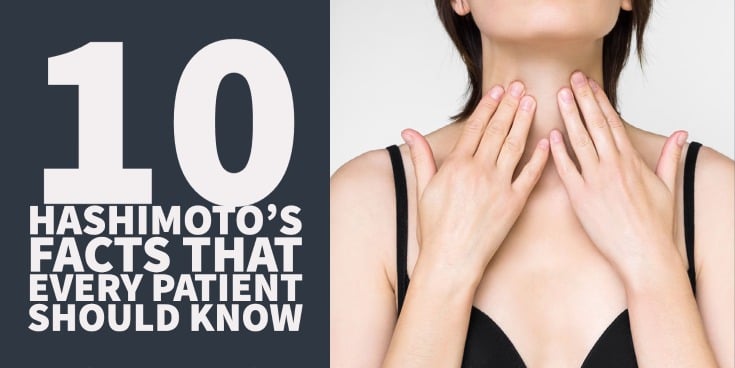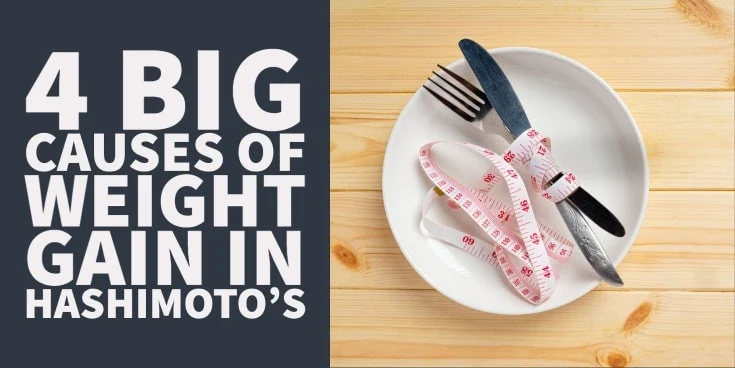Let me start off by saying that both Graves’ disease and Hashimoto’s thyroiditis are completely different disease states.
Despite there being a big difference between these two disease states there is a surprising amount of overlap between them as well.
This is why many patients probably get confused.
Perhaps the most simple way to think about these conditions is that one results in hyperthyroidism (Graves’ disease) and the other results in hypothyroidism (Hashimoto’s thyroiditis).
And while this is a simple way to look at these conditions it doesn’t account for the nuances in both conditions and can still leave patients somewhat confused.
Perhaps a better way to understand these thyroid conditions is to look at their similarities and their differences.
And today we are going to do just that.
You are going to learn…
- The major differences between Graves’ disease and Hashimoto’s
- Where there is significant overlap in these two thyroid conditions and where they deviate
- Why the long-term consequences of both conditions tend to lead to the same condition (low thyroid)
- The symptoms found in both conditions
- More about the overlap in treatment options for both conditions
- And more
Let’s jump in:
DOWNLOAD FREE RESOURCES
Foods to Avoid if you Have Thyroid Problems:
I’ve found that these 10 foods cause the most problems for thyroid patients. Learn which foods you should avoid if you have thyroid disease of any type.
The Complete List of Thyroid Lab tests:
The list includes optimal ranges, normal ranges, and the complete list of tests you need to diagnose and manage thyroid disease correctly!
Both Conditions Are Similar and can Evolve Into One Another
To make matters more complicated, you should be aware that Hashimoto’s can turn into Graves’ disease and Graves’ can turn into Hashimoto’s.
This has led many researchers to believe that these conditions are really two sides of the same coin.
To give you an idea of what I am talking about, consider these similarities:
- They are both conditions that negatively impact the thyroid
- They are BOTH autoimmune conditions
- They share many of the same TRIGGERS and CAUSES
- Thyroid autoantibodies are commonly seen in both conditions
- They can BOTH result in hyperthyroidism (more on this below)
- They can BOTH result in hypothyroidism (more on this below)
- There is some overlap in natural treatment options between both conditions
- The long-term consequences of both conditions tend to result in LOW thyroid function or hypothyroidism
- BOTH can be treated by focusing on immune function
And while these similarities are quite profound, there are definitely some differences between the two:
- Graves’ disease causes hyperthyroidism whereas Hashimoto’s thyroiditis CAN cause hyperthyroidism but is typically a disease characterized by hypothyroidism (low thyroid function)
- Graves’ disease causes additional problems such as thyroid eye disease
- Graves’ disease is associated with elevated antibodies to the TSH receptor
- The medical treatments for Graves’ disease are completely different from Hashimoto’s thyroiditis
Hyperthyroidism vs Hypothyroidism: It’s Not That Simple
Unfortunately, as I mentioned previously, it’s not as easy as just looking at thyroid function to determine which condition you have.
Instead, you must look at a combination of your symptoms, the trend of these symptoms, your antibody status, and even some other lab tests.
The reason is simple:
BOTH conditions can result in hyperthyroidism.
Graves’ disease is characterized by hyperthyroidism which means that almost everyone who has Graves’ disease (untreated) will experience HYPERthyroid symptoms.
If you tried to determine which thyroid condition you had just on the basis of your thyroid hormone status you would be wrong a large percentage of the time.
Why?
Because patients with Hashimoto’s can ALSO experience HYPERTHYROID symptoms even though that disease is primarily characterized by hypothyroid (low thyroid) symptoms.
Any condition which results in damage or inflammation to the thyroid gland, regardless of the antibodies present, may cause hyperthyroid symptoms.
And because Hashimoto’s is an inflammatory condition of the thyroid gland, there are some people who experience bouts of hyperthyroidism.
And while the percentage of patients with Hashimoto’s who experience hyperthyroid symptoms is low, it still does happen.
Which can make diagnosis difficult.
Because of this, you should never use your symptoms as a means to diagnose which thyroid condition you have.
In addition to your symptoms, you should also look at your thyroid antibody status.
Antibodies that are typically associated with Graves’ disease include antibodies to the TSH-R whereas antibodies typically associated with Hashimoto’s thyroiditis include anti-TPO antibodies and thyroglobulin antibodies.
Common Symptoms found in Graves’ Disease
While you would never want to use your symptoms alone, they can still be valuable.
Because Graves’ disease is associated with the TSH-R antibody it tends to ACTIVATE the thyroid gland.
This activation results in the overproduction of thyroid hormone from the thyroid gland.
As this thyroid hormone is pumped out of your body you will begin to experience the symptoms of hyperthyroidism.
And this is where things get interesting:
Thyroid hormone status exists on a spectrum.
This means that each person who has Graves’ disease will not experience the exact same symptoms.
Instead, the severity of their symptoms will depend on how much thyroid hormone is being pumped out of their thyroid gland.
Some people with Graves’ experience significant hyperthyroid symptoms whereas other people experience more mild symptoms.
One thing is for sure, though, as your thyroid turns on you will tend to experience these symptoms to some degree:
- Anxiety and irritation
- Heart palpitations and/or a rapid heart rate
- Tremors in your hands and extremities
- Hair loss including fine brittle hair
- Diarrhea or frequent bowel movements
- Weight loss and increased metabolism (it’s not as good as it sounds)
- Heat intolerance with warm hands/feet
- Soft nails which damage easily
- Insomnia or difficulty sleeping
- Frequent menstrual cycles (usually less than normal)
- Infertility or inability to ovulate
- Fatigue or low-energy
- *Bulging eyes
- Enlarge thyroid (from damage and inflammation)
These symptoms all indicate that you have TOO much thyroid hormone in your body and it’s important to remember that it’s possible to experience SOME of these symptoms if you have Hashimoto’s.
The biggest exception in the symptom list is that of bulging eyes.
Thyroid eye disease (1) tends to be reserved for people with Graves’ disease and occurs due to a different mechanism.
So if you have that symptom then there’s a high probability that you are suffering from Graves’ disease and not Hashimoto’s.
Common Symptoms found in Hashimoto’s Thyroiditis
Hashimoto’s thyroiditis tends to be associated with a different set of symptoms compared to that of Graves’.
While both thyroid conditions can cause a fluctuation in thyroid symptoms, Hashimoto’s tends to be more frequently associated with LOW thyroid symptoms.
Here’s how it happens:
Hashimoto’s thyroiditis results in damage to the thyroid gland.
The more that your thyroid gland is damaged the less likely it is to produce a sufficient amount of thyroid hormone.
Imagine smashing your finger with a hammer.
What happens?
It swells up and while you can still bend it, it doesn’t bend quite as well as it used to before you smashed it.
Now think about smashing your finger every day for 10 years.

That’s basically what is happening to your thyroid gland if you do not stop the damage and inflammation from the thyroid antibodies in Hashimoto’s.
Eventually, all of this damage and inflammation is permanent and the thyroid can no longer produce enough thyroid hormone.
This ultimately results in HYPOTHYROIDISM or low thyroid function.
Just like Graves’ disease, the severity of your hypothyroid symptoms depends largely on how much damage has been done to your thyroid gland.
If we line up 10 people and ask them about their symptoms we will no doubt hear that each one of them is fatigued.
But the severity of that fatigue could range from mild fatigue that makes some people feel a little run-down to the kind of fatigue that keeps you stuck in bed.
This applies to all of the following symptoms which are commonly found in Hashimoto’s.
These symptoms are the exact opposite of those found in hyperthyroidism, by the way:
- Fatigue or low-energy
- Weight gain
- Hair loss (usually dry and easily broken)
- Dry skin
- Constipation
- Depression
- Cold intolerance
- Menstrual irregularities (lack of ovulation)
- Infertility
- Joint or muscle pain
- Eyebrow hair loss
- Slower than normal heart rate
- Slowed metabolism
- Enlarged thyroid which is usually not painful
There is some minor crossover in the symptoms of Graves’ disease including things like hair loss and fatigue, but for the most part, the symptoms are the exact opposite.
You can typically identify which condition you have just by your symptoms alone.
But remember:
In the early stages of Hashimoto’s, these symptoms can fluctuate over time.
One month you may be hyperthyroid and the next month you may be hypothyroid.
Ultimately, though, you will almost always end up with persistent hypothyroid (low thyroid) symptoms in the long run.
Treatment Overlap in Both Conditions
Even though it may sound counterintuitive, there is quite a bit of overlap in terms of the treatment of these disease states.
Don’t get me wrong, there are also big differences, but if you are attempting to address the root cause of both conditions then you will be focusing on the same system.
And that system is the immune system or immune function.
BOTH Graves’ disease and Hashimoto’s thyroiditis are, after all, autoimmune diseases (2).
And these diseases stem from problems that occur in your body’s ability to accurately identify itself from other tissues.
This component, the autoimmune component, is different from the treatment for the thyroid component.
The thyroid component is where the treatments differ, but when we are talking about the immune system treatment, that’s where we see a lot of overlap.
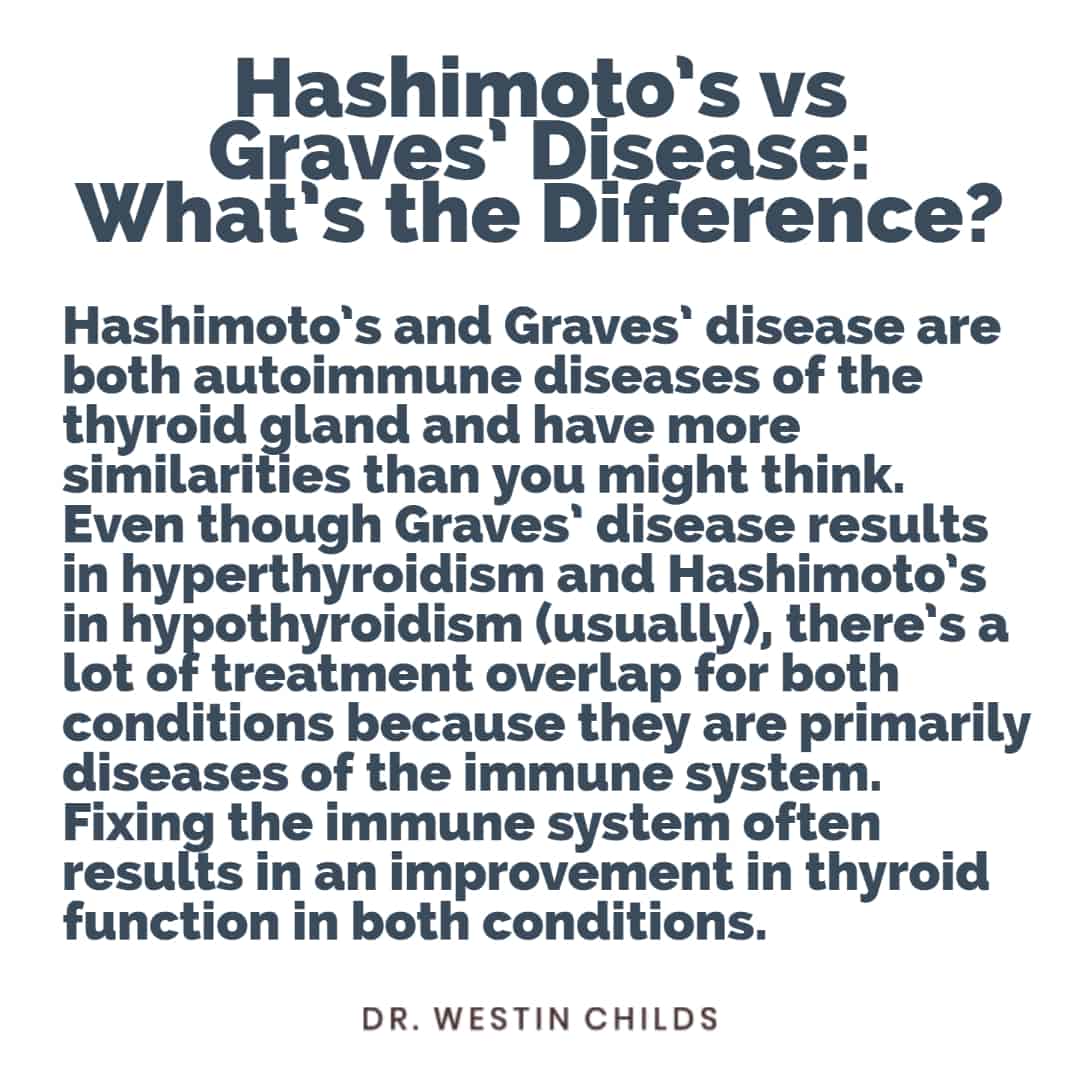
Unfortunately, conventional doctors don’t have many good therapies available to address immune function.
The best they have are steroids which naturally suppress immune function and other medications that attempt to shut down the immune response.
Because of this, they typically will often ignore the immune component and skip straight to the thyroid hormone management area.
When it comes to improving your immune system, you pretty much have to use more natural therapies.
We will talk about the medications that are used to treat Graves’ disease and Hashimoto’s in a second so stay tuned for that.
Natural Therapies to Boost Immune Function
Because doctors do not use medications to treat the immune component of Graves’ and Hashimoto’s, you will have to turn to more natural therapies.
But don’t worry because these natural therapies are actually quite effective and incredibly safe.
Some therapies that I’ve seen work particularly well include:
- Using zinc (over-the-counter supplement) – Zinc is involved in regulating your immune system (3) but it also plays an important role in thyroid function. While you are supplementing with zinc you might as well grab additional nutrients that help your thyroid function found in this multivitamin.
- Increasing your vitamin D level – Vitamin D also plays a very important role in immune function and most people with autoimmune problems have very low Vitamin D levels. You can easily improve your Vitamin D level with a vitamin D3 supplement.
- Reducing your exposure to chemicals and other environmental compounds – Chemicals require removal from your body and can cause inflammation and damage if they are stored or sequestered into your fat cells. Look at the type of soaps you are using, what types of makeup you are using, etc. to see all of the chemicals that you are inadvertently putting into your body.
- Eliminating or reducing your stress levels – Stress has been shown to suppress immune function! (4) Manage your stress levels to the best of your ability.
- Eating healthy organic whole foods – Organic whole foods provide your body with healthy nutrients as well as additional ingredients that reduce inflammation. Buying organic reduces your exposure to chemicals found on and in certain plants.
- Taking fish oil – Taking the right kind of fish oil can help improve your omega-3 fatty acid ratios and reduce inflammation.
- Avoiding a diet high in inflammatory industrial seed oils – Industrial seed oils, such as corn oil and canola oil, can cause inflammation and weaken certain cells in your body. Avoid these fats as much as possible.
These therapies are EASY to implement and VERY safe. And you can see a full list of supplements approved for Graves’ disease here and a full set of supplements approved for Hashimoto’s here.
Medications Used to Treat Graves’ Disease and Hashimoto’s
This is where the therapies and treatments start to diverge.
Therapies used to treat Graves’ disease focus primarily on LOWERING thyroid function while therapies used to treat Hashimoto’s primarily focus on INCREASING thyroid function.
Treatments for Graves’ disease include:
- Thyroid-blocking medications like methimazole and PTU
- Radioactive iodine ablation therapy (which destroys the thyroid gland with radiation)
- Thyroid surgery (known as thyroidectomy which completely removes the thyroid gland)
These therapies are all designed to reduce or slow down thyroid function.
Treatments for Hashimoto’s disease include:
- The use of prescription medications that contain thyroid hormone (including medications like levothyroxine, Synthroid, NDT, and so on)
These medications are meant to INCREASE thyroid function.
The one thing to notice with these medications is that while they do impact thyroid hormone levels in the body they really don’t do anything to treat the underlying cause of each condition.
They are more of a management type of treatment as opposed to a “cure”.
Final Thoughts
Even though both Hashimoto’s and Graves’ disease have a lot of similarities, they are still different disease states and often present with the exact opposite symptoms.
Whether you have Graves’ disease or Hashimoto’s you should know that BOTH conditions result from an impaired immune function and this is the area that you should focus on when it comes to treatment.
This is also the area most ignored by conventional doctors such as endocrinologists and family practice doctors which means you may have to do a lot of the heavy lifting on your own.
But rest assured knowing that you CAN impact your disease state and it may even be possible to reverse your condition (if you catch it early enough).
Now I want to hear from you:
Are you confused about your thyroid condition?
Do you have Graves’ disease or Hashimoto’?
What type of symptoms are you experiencing right now? Do you find your symptoms confusing?
What type of treatments or therapies are you currently using? Are they working for you? Why or why not?
Leave your questions or comments below!
Scientific References
#1. https://pubmed.ncbi.nlm.nih.gov/30124533/
#2. https://pubmed.ncbi.nlm.nih.gov/29083758/
#3. https://pubmed.ncbi.nlm.nih.gov/29324654/
#4. https://pubmed.ncbi.nlm.nih.gov/24798553/
